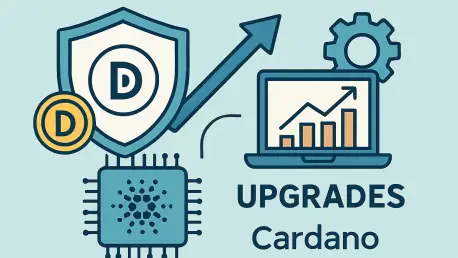In the ever-evolving landscape of blockchain technology, stablecoins have emerged as critical tools for bridging traditional finance with decentralized systems, offering stability in a volatile market. Among these, Cardano’s algorithmic stablecoin, DJED, has recently unveiled a series of transformative upgrades that promise to redefine its role in decentralized finance (DeFi) and Web3 ecosystems. Announced at a prominent blockchain conference, these enhancements, developed through a collaboration between COTI and Input Output Global (IOG), focus on privacy, accessibility, and interoperability. As the demand for secure and versatile digital assets grows, DJED’s latest developments position it as a key player in addressing diverse needs, from community-driven innovation to enterprise-level confidentiality. This strategic evolution not only strengthens Cardano’s standing in the blockchain space but also highlights a broader trend toward creating more adaptable and inclusive financial tools for a global audience.
Open-Source Innovation for Community Empowerment
The shift to an open-source model marks a significant milestone for DJED, reflecting a commitment to transparency and collaboration within the Cardano ecosystem. By making critical components such as the order API, chain indexer, and frontend publicly accessible, IOG and COTI aim to empower developers to inspect, modify, and build upon the protocol. This approach aligns with the core principles of Web3, fostering decentralization and encouraging the creation of custom applications and integrations into wallets and decentralized applications (dApps). Having demonstrated reliability on the Cardano blockchain for an extended period, DJED’s open-source transition is poised to accelerate innovation by enabling new use cases and refining existing features. The emphasis on transparency also builds trust, as developers and users alike can verify the protocol’s integrity, ensuring that it remains a secure and dependable asset in an increasingly competitive market.
Beyond the technical benefits, the open-source framework of DJED is designed to cultivate a vibrant community of contributors who can drive its evolution. This move allows for a diverse range of perspectives and expertise to shape the stablecoin’s future, potentially leading to groundbreaking applications that address specific regional or industry needs. IOG has underscored the protocol’s robust design, rooted in formal methods and rigorous testing, which provides a high level of assurance in its complex system. As developers gain access to these tools, the potential for creating tailored solutions—whether for small-scale projects or large-scale integrations—becomes immense. This democratization of access not only enhances DJED’s utility but also sets a precedent for how blockchain projects can balance innovation with accountability, ensuring that growth is both inclusive and sustainable over time.
Privacy-Focused Solutions for Enterprise Needs
Another pivotal upgrade to DJED is the introduction of Private DJED, a version specifically crafted to meet the confidentiality demands of enterprises and institutions engaging in DeFi and Web3. This iteration incorporates a dedicated privacy layer that enables secure and anonymous transactions, addressing the critical need for protecting sensitive information in financial operations. By leveraging advanced encryption techniques, such as garbled circuits, COTI ensures a scalable and reliable infrastructure that maintains privacy without compromising performance. This feature positions DJED as an ideal choice for complex dApps where data protection is paramount, while also adhering to regulatory standards that are often a barrier to blockchain adoption in traditional finance sectors.
The multi-chain functionality of Private DJED further expands its reach, allowing it to operate across various blockchain networks and enhancing its interoperability. This adaptability makes it a versatile tool for businesses looking to integrate blockchain solutions into their existing systems without being confined to a single platform. The focus on enterprise-readiness reflects a growing trend of bridging the gap between conventional financial systems and decentralized technologies, catering to the unique needs of institutional players. By offering a stablecoin that prioritizes both privacy and compliance, DJED addresses a niche but vital market segment, potentially accelerating the adoption of blockchain solutions among larger entities. This strategic enhancement underscores the importance of tailoring digital assets to meet specific user requirements in an increasingly interconnected financial landscape.
Strategic Vision for a Decentralized Future
Looking back, the upgrades to DJED represent a thoughtful response to the diverse demands within the blockchain community, balancing openness with security. The open-source initiative invites global collaboration, allowing developers to contribute to and benefit from a transparent protocol, while Private DJED caters to enterprises with a need for confidentiality in their transactions. These advancements demonstrate a nuanced understanding of the evolving DeFi and Web3 landscapes, where stability alone is no longer sufficient. Moving forward, stakeholders should focus on leveraging these tools to explore innovative applications, whether through community-driven projects or institutional partnerships. Monitoring how these upgrades influence adoption rates and spur new use cases will be crucial, as will ensuring that the balance between accessibility and privacy continues to evolve. DJED’s journey offers a blueprint for how stablecoins can adapt to multifaceted needs, paving the way for more inclusive and secure financial systems in the decentralized era.









